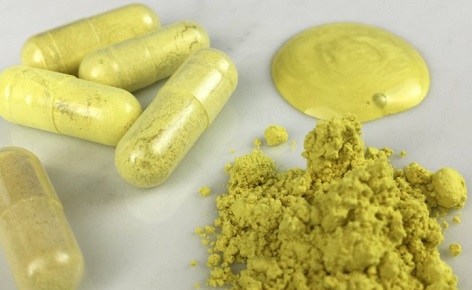Nikhil Prasad Fact checked by:Thailand Medical News Team Nov 06, 2024 1 year, 3 months, 1 week, 6 days, 4 hours, 18 minutes ago
Medical News: Understanding Liver Health with Quercetin
Recent research sheds light on quercetin, a naturally occurring antioxidant found in common foods, as a promising solution for managing Metabolic Dysfunction-Associated Steatotic Liver Disease (MASLD). Researchers from the Medical University of Lublin and the Warsaw University of Life Sciences in Poland have revealed quercetin's potential to improve liver health by reducing inflammation and regulating lipid metabolism.
 Quercetin Shows Promise in Managing Liver Disease Tied to Modern Lifestyles
Quercetin Shows Promise in Managing Liver Disease Tied to Modern Lifestyles
This
Medical News report dives into how quercetin could become a valuable tool for people dealing with liver issues linked to obesity, diabetes, and high blood pressure. MASLD, previously called non-alcoholic fatty liver disease, affects a significant portion of the global population due to lifestyle habits like poor diet and lack of exercise.
Key Findings: The Role of Quercetin
Quercetin is part of the flavonoid group, found in fruits, vegetables, and green leaves. Known for its antioxidant and anti-inflammatory properties, it counters oxidative stress and inflammation in the liver. The researchers observed that quercetin also regulates lipid levels, making it particularly beneficial for MASLD patients. Here’s a closer look at the core benefits:
-Reducing Oxidative Stress: Quercetin’s antioxidant abilities combat damage caused by free radicals. Studies showed it enhances the production of natural antioxidants like glutathione, offering additional support to liver function.
-Managing Inflammation: Chronic inflammation is a hallmark of MASLD. Quercetin inhibits the release of inflammatory cytokines such as TNF-α and IL-6, which contribute to liver damage. This anti-inflammatory action helps protect liver cells and prevent further disease progression.
-Improving Lipid Metabolism: An excess of fats in the liver can exacerbate MASLD. Quercetin reduces liver fat by regulating lipid metabolism genes, effectively curbing the liver's fat buildup. This also decreases triglyceride levels, making it useful for those managing high cholesterol.
The Path to Liver Health: Mechanisms of Action
Researchers propose multiple ways that quercetin supports liver health:
Oxidative Defense: Quercetin reduces oxidative stress, which is crucial because excess stress damages cells. By boosting natural antioxidant levels, quercetin shields liver cells from damage.
-Regulation of Inflammatory Pathways: In MASLD, inflammation activates liver cell apoptosis, or cell death, worsening the condition. Quercetin can mitigate this by downregulating genes responsible for inflammation, thereby reducing liver cell injury.
-Lipid Control: Quercetin appears to activate pathways that manage fat metabolism, making it harder f
or excess fats to build up in the liver.
Gut Health Connection: The Gut-Liver Axis
Emerging studies highlight the impact of gut health on liver function, especially in MASLD. The gut-liver axis - a term for the relationship between gut health and liver function - plays a crucial role here. Quercetin helps maintain a balanced gut microbiome, preventing harmful bacteria from triggering liver inflammation. It also supports beneficial bacteria, such as Akkermansia muciniphila, which is vital for metabolic health.
Preclinical Studies: Promising Results
Preclinical animal studies indicate that quercetin’s impact on liver health is profound:
-Animal Models: Rats fed a high-fat diet and supplemented with quercetin showed reduced liver fat and inflammation, while liver enzyme levels dropped, signifying better liver function.
-Human Trials: Though in early stages, human trials suggest that people who consume quercetin-rich foods experience less liver damage, better metabolic health, and lower cholesterol.
Moving Forward: Challenges and Future Research
Despite these encouraging findings, researchers emphasize the need for more in-depth studies. Identifying the optimal dosage and long-term safety of quercetin is essential before it can be recommended as a regular supplement for MASLD management. Additionally, further clinical trials are needed to confirm its efficacy in human subjects.
Conclusion
Incorporating natural compounds like quercetin into liver disease treatment strategies could pave the way for safer, more effective management options. As quercetin becomes more researched, it holds promise for those seeking natural interventions to improve liver health. With quercetin showing anti-inflammatory and antioxidant benefits, MASLD patients might soon have a powerful ally in fighting liver disease naturally.
The study findings were published in the peer-reviewed journal: Molecules.
https://www.mdpi.com/1420-3049/29/22/5245
For the latest on managing Metabolic Dysfunction-Associated Steatotic Liver Disease, keep on logging to Thailand
Medical News.
Read Also:
https://www.thailandmedical.news/news/covid-19-news-fatty-acids-impact-ace2-receptor-expression-in-metabolic-dysfunction-associated-steatotic-liver-disease
https://www.thailandmedical.news/news/daily-orange-consumption-reduces-liver-disease-risk
